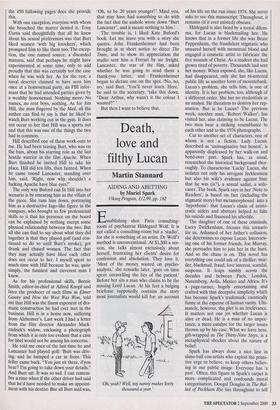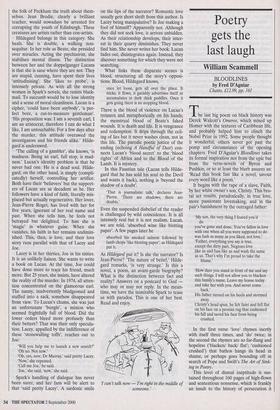Death, love and filthy Lucan
Martin Stannard
AIDING AND ABETTING by Muriel Spark Viking Penguin, £12.99, pp. 182 Establishing shot: Paris consulting- room of psychiatrist Hildegard Wolf. It is not called a consulting-room but a 'studio', for she is something of an artist. Dr Wolf's method is unconventional. At $1,500 a ses- sion, she talks almost exclusively about herself, frustrating her clients' desire for confession and absolution. They love it. `Most of the money wasted on psycho- analysts,' she remarks later, 'goes on time spent unravelling the lies of the patient.' Before her sits a man who claims to be the missing Lord Lucan. At his feet a bulging briefcase supposedly contains the story most journalists would kill for: an account `Oh, yeah? Well, my nanny makes forty thousand a year.' of his life on the run since 1974. She never asks to see this manuscript. Throughout, it remains (if it ever existed) obscure.
Hildegard is also faced by a moral dilem- ma, for Lucan is blackmailing her. He knows that in a former life she was Beate Pappenheim, the fraudulent stigmatic who smeared herself with menstrual blood and engaged a cosmetic artist to fabricate the five wounds of Christ. As a student she had grown tired of poverty. Thousands had sent her money. When exposed, she, like Lucan, had disappeared, only she has re-entered public life as another form of mountebank. Lucan's problem, she tells him, is one of identity. It is her problem, too, although of a different order. She has no credentials as an analyst. He threatens to destroy her rep- utation. But is he Lucan? The previous week, another man, 'Robert Walker', has visited her, also claiming to be Lucan. The two men bear a striking resemblance to each other and to the 1974 photographs.
Cut to another set of characters, one of whom is not a fiction. Lady Lucan, described as 'unimaginative but honest', is apparently displeased by her walk-on and bend-over part. Spark has, as usual, researched the historical background thor- oughly. To characterise 'Lucky' Lucan, she isolates not only his arrogant fecklessness but also his wife's evidence against him: that he was (is?), a sexual sadist, a wife- caner. The book, Spark says in her 'Note to Readers', is based on fact (including the stigmatic story) but metamorphosed into a `hypothesis': that Lucan's chain of aristo- cratic aiders and abettors helped to fake his suicide and financed his afterlife.
The daughter of one of these criminals. Lacey Twickenham, focuses this scenario for us. Ashamed of her father's collusion, she determines to expose Lucan. Interview- ing one of his former friends, Joe Murray, she persuades him to join her in the hunt. And so the chase is on. This novel has everything one could ask of a thriller: mur- der, blackmail, fraud, love interest, scandal, suspense. It leaps nimbly across the decades and between Paris, London, Nuremberg, Avila, Mexico and Africa. It's a page-turner, hugely entertaining and crafted with that deceptive simplicity which has become Spark's trademark, caustically funny at the expense of human vanity. Ulti- mately, however, the plot is an irrelevance. It matters not one jot whether Lucan is alive or dead. He is a man of no impor- tance, a mere catalyst for the larger issues thrown up by his case. What we have here, gift-wrapped as The Thirty-Nine Steps, is a metaphysical shocker about the nature of belief.
Spark has always done a nice line in slime-ball con-artists who exploit the primi- tive urge to believe, to keep others believ- ing in our public image. Everyone has 'a past'. Often, this figure in Spark's carpet is more complicated and confounds moral categorisation. Dougal Douglas in The Bal- lad of Peckham Rye lies throughout to tell the folk of Peckham the truth about them- selves. Jean Brodie, clearly a brilliant teacher, would nowadays be arrested for corrupting the youth of Edinburgh. These creatures are artists rather than con-artists.
Hildegard belongs in this category. She heals. She is double, a walking non- sequitur. In her role as Beate, she presided over miracles. Acting the psychiatrist, she stabilises mental illness. The distinction between her and the doppelganger Lucans is that she is sane where they are not. They are stupid, cunning, have spent their lives 'attitudinising'. She 'likes to probe', is intensely private. As with all the strong women in Spark's novels, she resists black- mail. To succumb would be to lose identity and a sense of moral cleanliness. Lucan is a cipher, 'could have been anybody', 'a per- fect bore, a cut-to-measure gentleman'. 'His proposition was: I am a seventh earl, I am an aristocrat, therefore I can do what I like, I am untouchable. For a few days after the murder, this attitude overawed the investigators and his friends alike.' Hilde- gard is underawed.
'The calling of a gambler', she knows, 'is madness. Being an earl, full stop, is mad- ness.' Lucan's identity problem is that he never had one. He is a dead soul. Hilde- gard, on the other hand, is simply (compli- catedly) herself, controlling her artifice. Both have their 'believers' but the support- ers of Lucan are as decadent as he. Her followers have a kind of faith, literally mis- placed but actually regenerative. Her lover, Jean-Pierre Roget, has lived with her for five years, ignorant of her real name and past. When she tells him, he feels not betrayed but delighted. To him she is 'magic' in whatever guise. When she vanishes, his faith in her remains undimin- ished. This, then, is love, and their love story runs parallel with that of Lacey and Joe.
Lacey is in her thirties, Joe in his sixties. It is an unlikely liaison. She wants to write a book on Lucan. At the time, Joe could have done more to trace his friend, much more. But 25 years, she insists, have altered the reality of the murder. In 1974, all atten- tion concentrated on the glamorous earl. The nanny, inadvertently bludgeoned and stuffed into a sack, somehow disappeared from view. To Lucan's chums, she was just an unfortunate 'bungle', a minion who seemed frightfully full of blood. Did the lower orders bleed more profusely than their betters? That was their only specula- tion. Lacey, appalled by the indifference of these 'stonewalling toffs', reaches out to Joe: 'Will you help me to launch a new search?' 'Oh no. Not now.'
'Oh, yes, now, Dr Murray,' said pretty Lacey. 'Now,' she repeated.
'Call me Joe,' he said.
'Joe,' she said, 'now,' she said.
Spark's handling of dialogue has never been surer, and her fans will be alert to that 'said pretty Lacey'. A sardonic smile on the lips of the narrator? Romantic love usually gets short shrift from this author. Is Lacey being manipulative? Is Joe making a fool of himself? Apparently not. Although they did not seek love, it arrives unbidden. As their relationship develops, their inter- est in their quarry diminishes. They never find him. She never writes her book. Lucan fades out, disintegrates again. Instead, they discover something for which they were not searching.
What links these disparate scenes is blood, structuring all the story's opposi- tions. Blood, Hildegard knows,
once let loose, gets all over the place. It sticks, it flows, it garishly advertises itself or accumulates in dark thick puddles. Once it gets going there is no stopping blood.
There is the blood of violence on Lucan's trousers and metaphorically on his hands; the menstrual blood of Beate's faked wounds. It is death and life. It is vengeance and redemption. It drips through the ceil- ing of lies but it never washes clean, not in this life. The parodic poetic justice of the ending (echoing A Handful of Dust) con- nects Lucan's 'blood secret' to the 'blood rights' of Africa and to the Blood of the Lamb. It is mystery.
In this Faustian tale (Lucan tells Hilde- gard that he has sold his soul to the Devil and wants it back), nothing is 'beyond the shadow of a doubt'.
'That is journalistic talk,' declares Jean- Pierre. 'There are shadows; there are doubts.'
Even the suspended disbelief of the reader is challenged by wild coincidence. It is all intensely real but it is not realism. Lucan, we are told, 'absorbed wine like blotting paper'. A few pages later he
absorbed his smoked salmon followed by lamb chops 'like blotting paper', as Hildegard put it.
As Hildegard put it? Is she the narrator? Is Jean-Pierre? 'The nature of belief,' Hilde- gard remarks, 'is very strange.' Is this a novel, a poem, an avant-garde biography? What is the distinction between fact and reality? Answers on .a postcard to God who may or may not reply. In the mean- time, we have the inimitable Spark to tease us with paradox. This is one of her best. Read and enjoy.
I can't talk now — I'm right in the middle of someone.'



























































 Previous page
Previous page